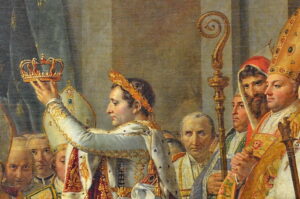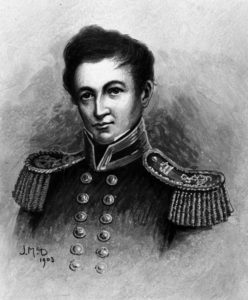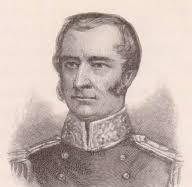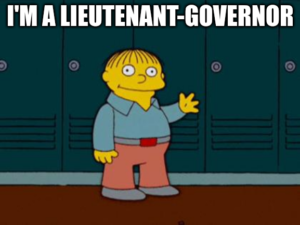1840: Hobson Crowns Himself
November 24, 2021
By AHNZ

On 30 January, 1840, Captain William Hobson ‘crowned’ himself Lieutenant Governor of New Zealand. It was an audacious move, a confidence trick that relied on Hobson’s people and the population at the Bay of Islands allowing him to get away with it. They did.
Plenty of people can be accused of self-promotion but we usually mean they are seeking to lift their popularity profile and promote their fame. Hobson literally promoted himself up the ranks from Consul to Lieutenant-Governor to Governor. This was the same thing a humble tax collector (James Busby) and an exiled Lord (Sovereign King of New Zealand Baron De Thierry) had maneuvered to do in the 1830s but the Captain made them look like rookies. Maybe it takes a man in uniform to pull this sort of thing off? General Napoleon Bonaparte crowned himself Emperor of the French in 1804.
Hobson had left England with two commissions. The operative one, and for which he was given full pay, was Consul. As Consul, Hobson was authorised to treat with the New Zealanders, Settlers and Maoris, on behalf of the Crown and establish sovereignty over the country. The “eventual” commission, on half-pay only, was Lieutenant-Governor of New Zealand. This office would eventuate on the event that Consul Hobson found willing subscribers in New Zealand. Hobson set off on 28 August, 1839, on HMS Druid for Sydney and signed himself out “Consul.”
 On Christmas Eve, 1839, the commander of the HMS Druid (the great-great-grand uncle of Winston Churchill) dropped Consul Hobson off in Sydney before the ship set out to join in with the Opium War. This is a reminder that Hobson pulled off his confidence trick under the cover of most attention being occupied with China rather than the obscure and unwanted whaler’s islands that New Zealand was held to be.
On Christmas Eve, 1839, the commander of the HMS Druid (the great-great-grand uncle of Winston Churchill) dropped Consul Hobson off in Sydney before the ship set out to join in with the Opium War. This is a reminder that Hobson pulled off his confidence trick under the cover of most attention being occupied with China rather than the obscure and unwanted whaler’s islands that New Zealand was held to be.
Now in Australia, it was essential that New South Wales Governor George Gipps (image left) be supportive of Hobson’s (image right) plan for New Zeland. Gipps stood to gain a new territory, New Zealand, and a new subordinate in Hobson. He was all aboard! Besides, there was reason to hurry while the Opium war served as distraction and because free people were already Settling and establishing themselves in Wellington. Major Gipps and Captain Hobson needed to get down there to New Zealand and make sure these people knew they needed someone to rule them!
 On 18 January, 1840, Gipps sent HMS Herald for the Bay of Islands with Consul Hobson aboard. The very next day, 19 January, Gipps proclaimed that Hobson was Lieutenant-Governor and put him on full pay as such. This, he back-dated to 14 January. Meanwhile, Consul Hobson did much the same thing himself. Either behind each other’s backs or by pre-planning, the ‘Excellencies’ were out to get New Zealand and it was not a negotiation. On 30 January, Hobson strode from the beach at Kororareka and into the church. “I have this day entered on the duties of my said office as Lieutenant-Governor..” he said, making proclamations and signing them as such.
On 18 January, 1840, Gipps sent HMS Herald for the Bay of Islands with Consul Hobson aboard. The very next day, 19 January, Gipps proclaimed that Hobson was Lieutenant-Governor and put him on full pay as such. This, he back-dated to 14 January. Meanwhile, Consul Hobson did much the same thing himself. Either behind each other’s backs or by pre-planning, the ‘Excellencies’ were out to get New Zealand and it was not a negotiation. On 30 January, Hobson strode from the beach at Kororareka and into the church. “I have this day entered on the duties of my said office as Lieutenant-Governor..” he said, making proclamations and signing them as such.
We’re talking about the very founding of our government here. This is where New Zealand’s State was born. Prior to this New Zealand had no Boss, no Governor. Since this action New Zealand has had a string of Governors stretching down to the latest one appointed only this year. Hobson would die in 1842 and perhaps it was due to the stress of maintaining the pretenses of this very long con’?
One initial hitch was the captain of the HMS Herald, Captain Joseph Nias who insisted on the proper eleven-gun salute due to a British consul rather than the fifteen-gun salute for Lt. Governor that Hobson hotly demanded. The cantankerous old Captain Nias was a threat to the whole scam! He knew that Hobson was nothing more than a Consul and that he was being paid by Her Majesty to do consular work. Of course there would be no future for him in New Zealand; He was returned permanently to Britain1.
“He had been given two commissions; one appointing him Consul, the other, Lieutenant-Governor over any territory which might be acquired for Great Britain in New Zealand. The intention of the British Government was plainly that, in his capacity as Consul, he should negotiate with the Maoris for the recognition of British sovereignty, and should then take office as Lieutenant-Governor over such parts of the country as they should cede. On arriving at the Bay of Islands, however, and before the negotiations at Waitangi, he declared himself Lieutenant-Governor. His intention was, presumably, to assert his authority over British subjects in the vicinity, but his procedure was anomalous, for he had proclaimed himself Lieutenant-Governor of a British colony that did not, as yet, exist.”- p72 Sinclair (1959)
“Hobson was not possessed of overmuch sensitivity. As far as the actual declaration of British sovereignty was concerned, nether he nor the missionaries were inclined to regard Maori objections and reservations as critical. Hobson had long favored the annexation of the whole of New Zealand and from the moment of landing began to perform acts of sovereignty. At Waitangi he accepted the signatures of the chiefs, well aware that they were largely signing in trust of missionary assurances as to their future position and without clear understanding of the Treaty’s implications. His instructions to officers who subsequently hawked the Treaty about the country also suggest that he saw the task as an exercise in public relations rather than a weighty mission, the issue of which was in serious doubt.” – p43 Ward (1974)
Hobson kept Live-Action-Role-Playing as Lieutenant-Governor with conspicuous acts of sovereignty around the Bay of Islands. He short-circuited his role of Consul and moved right along to being Lieutenant-Governor from his first day. You could say it’s an act of fraud for him to accept pay as a Consul and not do the duty at all. He asked permission for nobody, he rolled out his own red carpet. Long before even the first signatures of the Treaty of Waitangi were collected on February 6th the Sovereignty over New Zealand was a fait accompli. Neither Hobson nor Gipps gave a damn about negotiations or consent. So much for February 6th being our national day! Hobson ordained the nation his prize on 30th January and Gipps on 19th January (retroactively to the 14th of January.)
“Waitangi Day isn’t an authentic, grass roots, event going back to 1840. It was an invention of the 1970s¹, an institution created by the state. Much similar to how Sir Walter Scott invented Scottish identity. Nothing organic about it at all.” – 1970s: Kiwis have no idea when the Treaty of Waitangi was signed; AHNZ
“Until 1932, the Waitangi Treaty Grounds and the Treaty House were in a shambles. The Governor General and his wife were appealed to and in a private act of charity purchased Waitangi along with 1000 acres of land as part of the estate. In 1934 all was ready for New Zealand’s first Waitangi Day.” – 1934: First Waitangi Day; AHNZ
“Nias may have been cantankerous but he was right. Despite the nature of the legal preliminaries, Hobson’s status was contingent on the outcome of his negotiations with the Maoris for cession which, had they failed, would have meant the suppression of his warrant as Lieutenant-Governor and the operation of his commission as consul. Hobson fully realised this…” – McLintock (1958)
“How d’ye do, Mr. Governor?”- Chief Rewa, Ngai Tawake
“Captain William Hobson was first appointed Lieutenant-Governor of New Zealand by letters patent on 24 [16th actually] November 1840 (having previously been the British Consul to New Zealand), when New Zealand was part of the colony of New South Wales” – Governor-General of New Zealand, Wikipedia

When Hobson’s navy boots hit that Kororareka beach sand it was essential that everyone was on-message and not calling him ‘Captain’ or ‘Consul’. On 3 February the “Kororareka community” presented an address of welcome to the “Lieutenant-Governor of New Zealand” and it makes you wonder who put them up to it? However it was done, this was essential public relations.
A second initial hitch to our Captain Hobson establishing his hegemony was potentially greater than his confrontation with Captain Nias. New Zealand already had a consul in the person of James Clendon. To carry the day, Hobson would not just need to win the Battle of the Captains. He had to win the Battle of the Consuls as well.
Fortunately, Consul Hobson (Britain) had something that Consul Clendon (USA) wanted: Money. Clendon all of a sudden became very helpful to Hobson and influenced the Maoris to sign the Treaty. He also helped disarm and disenfranchise the American Whalers he was supposed to be representing. Sold them out. Clendon also got busy buying up land cheaply and selling it to Hobson very dearly. Sounds a lot like money laundering to me! When the deal was done, Clendon took his ‘earnings’ and re-located to the other side of the island. He and his wife are remembered today by wooden Maori-style statues at their old house in Rawene.
Mainstream New Zealand historians have long wondered at the “irregularities” in money and land dealings between Consul Hobson and Consul Clendon. Hobson purchased from Clendon, on Clendon’s advice as a local expert real estate agent, land at Okiato to be New Zealand’s first capital, Russell. Hobson paid £15,000 for land when its real worth was assessed at less than £1502. Hobson also later paid £16,000 to have his pre-fab house set up although the quoted cost had been just £2,000. Clendon was also receiver of a large plot of land at what is now Clendon Park, Auckland.
Captain…Consul…Lieutenant-Governor Hobson made sure the right palms were oiled. Read the reports of the speeches at the Treaty of Waitangi ‘negotiations’ and you can see that everyone is fooled. Everyone is already referring to Hobson as “Lieutenant-Governor” on the basis that that’s who he said he was. If you can get people asking the wrong questions they don’t care about the answers. Even the Maoris were referring to Hobson as “Governor” when he wasn’t. If it’s true, as one source tells us, that Hobson made the pledge by muttering “We are now one people” then it’s a wonder he didn’t give himself a heart attack by suppressed hollow laughter.
1840: Hobson Gang exercises British Sovereignty over the French at Akaroa
1840: Dissolving the Port Nicholson Settlers’ Council
1840: “Britain did not want sovereignty over Māori”
The lie of Lieutenant-Governor Hobson told by himself and Gipps hinged, in the end, on being ratified back home. The Colonial Office could have viewed self-invented officials as a dangerous outbreak and hanged both men as traitors. It didn’t go that way at all. In the middle of the Opium War who has time to muck about disciplining the boss of a prison colony and the boss of a whale blubber colony anyway? Most importantly though it must be that William Hobson had friends on the inside to put him up to what he did and make sure it was sanctioned after the fact. His status as Lieutenant-Governor was ratified by Letters Patient on 16 November 1840. Emboldened, he went on to the final act of ‘crowning’ himself Governor of New Zealand on 3 May 1841 thus inventing the Crown Colony of New Zealand. Again, instead of being shot, Hobson was confirmed for his boldness soon after when the mail from Britain arrived to say his lie was now true!
And that’s why I stopped studying law. You can fill your head up with as many legal principles as you like and bend over backwards in obedience to precedent but someone like Hobson can come along tomorrow and invalidate everything. New Zealand was built that way and still relies on the public not being aware of it or there would be rebellion in the streets.
—
1 Ref. National Portrait Gallery, UK
2 Ref. p370, New Zealand’s Heritage (1971)
Image ref. The Coronation of Napoleon Bonaparte, Jacques-Louis David (1807); Cove Collective
Ref. A History of New Zealand, Sinclair (1959)
Ref. A Show of Justice, Ward (1974)
Ref. Crown Colony Government in New Zealand, McLintock (1958)
 Like Comment Share
Like Comment Share





